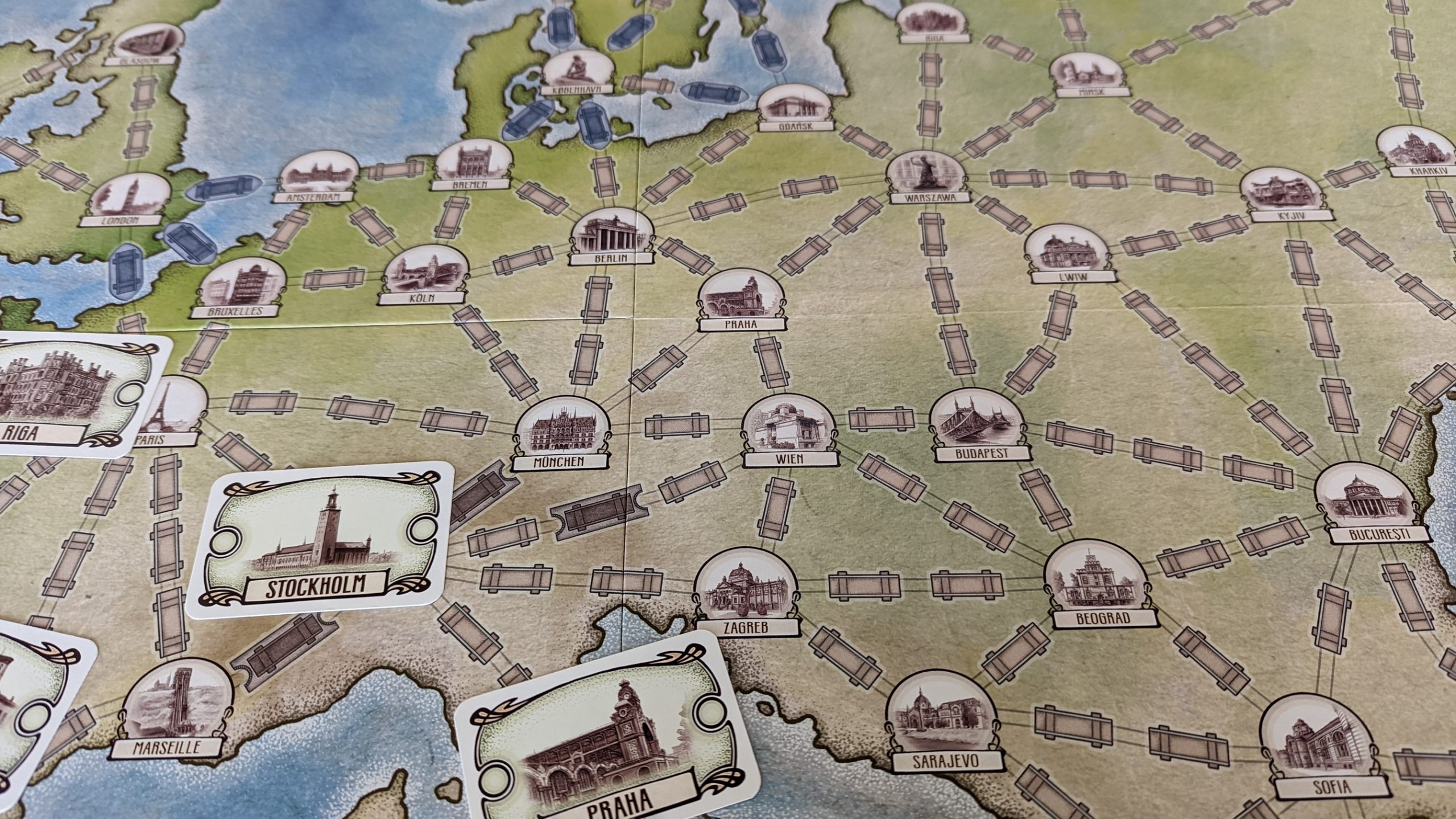If you’re reading this, I feel comfortable assuming that you’ve played the introductory route-building game Ticket to Ride. It’s certainly fun enough that I don’t hate playing it with friends and family that are newer to the hobby, but I don’t think anyone would argue with me if I were to assert that it lacks a certain bite, or crunchy decisions. Friedeman Friese’s Free Ride feels like a stepping stone into crunchier games for Ticket to Ride fans. I honestly wasn’t expecting much from it when it was released last year with little to no fanfare, but I was pleasantly surprised in my first few plays.
The core gameplay is simple enough: on your turn, you either lay track, claiming any connections you finish between cities, grab five new pieces of track to lay later, or move your train two cities, finishing and picking up new city-to-city routes as you go. Moving on your routes and unclaimed routes is free, but to use another player’s route, you have to pay them a coin to remove their claim. So the question is, do you spend your turns laying track to make connections, or do you sprint from city to city to complete as many routes as possible, even if it means reduced points for repeating city cards? I was pleasantly surprised, because this loop and the tension of building longer connections that may get claimed by opponents is legitimately quite fun.

And that would be that, review over, everyone needs to pick up their own copy of Free Ride, except there are some real faults here that make me hesitate to recommend it. In a network building/pick up and deliver hybrid design like this, the game’s map is going to be the focal point of every decision, and, to put it bluntly, the map and city cards are readability nightmares. I understand the desire to feature impressive local architecture on city cards, along with using local names for cities instead of the anglicized versions, but at some point, game flow has to be taken into account. Maybe it’s just that I’m North American scum, to use the words of LCD Soundsystem, but I honestly couldn’t point to Prague or Copenhagen on a map of Europe without some time or help, let alone Lwiw or Tirane. The search for these cities would be greatly expedited by location maps on city cards, or simplified by colored regions as in Friese’s Masterpiece, Power Grid. Even if players were unable to find the exact location of available cities within their regions, they should be able to reasonably easily intuit that a route that stays within a single region or ends in a region next to another available pick-up city would be efficient. Instead, players are left trying to sieve through greyscale building illustrations on a monochrome map of Friese’s trademark green. This issue may not have come up in playtesting with people familiar with Europe, but as it is, this necessary pause every turn to map out efficiencies slowed a game that arguably doesn’t have the depth to otherwise necessitate drawn-out decisions down to a crawl. After timing later games, as players grew more and more familiar with the game mechanics, but still needed time to parse the map, looking at the map to determine efficiency became a full third of the game’s play time. Other reviewers have suggested going all Armie Hammer and cannibalizing other games to find pieces to use as markers, but as I have said before, I firmly believe that it shouldn’t be on the consumer to fix problems with a publisher’s luxury good.
There is one more, admittedly minor fault I hold against Free Ride- the end game feels a smidge rote, like it finishes with a whimper instead of a bang. It feels like trains becoming faster after hitting the third deck was implemented to help with this feeling, but since players can decide to simply withdraw from the game and collect points for each round that other players continue to play, this burst of speed instead leads to players dragging the game out for more turns with this extra efficiency, instead of quitting when the game otherwise feels like it has reached its climax to more naturally finish.

















